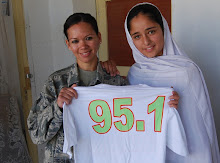My brother just returned from a deployment to Afghanistan. He turned 20 years old while there. It was his first deployment and I did my best to prepare him for his experience, but you can never fully prepare someone as each deployment is unique to the person in the midst of it. Every experience shapes a person differently because the life you have lived thus far affects your actions and way of thinking. He let me in on more going on there than anyone back home but that’s only because he felt I could understand since I’ve been the military for 12 years and had returned from Afghanistan a few months before he arrived there.
He has now been back to his home station for a month and although I tried my best once again to prepare him for the transition of being back home, I don’t think it really hit him that it really is a “transition” and not an automatic “everything is the same now that I’m home” until he started having anxiety attacks. Anxiety attacks, from someone who just returned from a deployment? Weird right? Obviously not because many have heard about the difficulties servicemembers face when they return from war zones, but what’s important to note is we’re still not where we need to be with providing military members information and tools necessary to know that this is normal, that they are not going to get in trouble if they let people know they are struggling, and that needing help during the transition home isn’t a career ender. Sadly my brother only knew he was experiencing anxiety attacks because he finally Googled his symptoms. He then only let me know because I have made it my business to be his military mentor so he felt I would understand and know what to do.
The red flag and what scares me isn’t the anxiety attacks, it’s the fact that if he didn’t have me to go to, he wouldn’t have told ANYONE. He was worried there would be repercussions.
We had a long conversation where I explained to him that isn’t the case. I let him know about various options for counseling such as Mental Health (which some servicemembers fear because everything is documented) to Chaplains (where information is kept confidential). I let him know they ARE options and to never feel you have to keep quiet about needing help. When we were done I could almost feel the sigh of relief that he let it out when I told him, “Hey, this is normal.”
You would think people like my brother would know this already because we hear stories all the time. But when it’s actually YOU experiencing it, you find yourself thinking that only people who have experienced the absolute extreme go through difficulties, and that your experience doesn’t fit the bill. You feel that what you went through wasn’t horrific enough, and you don’t see yourself in the same category as the publicized stories you hear. You understand that you’ve been through some stuff and seen some stuff, but you tell yourself it’s different and you should be fine. This is one of the reasons so many ignore the signs and don’t tell anyone.
My brother will now receive the help he needs, but what about those without a sister who happens to be in the military with similar experiences? Well if you’re in the military, have the candid talks with your troops before, during and after a deployment. Be that person for them—it’s your duty. You may be the only person they feel can understand.
If you are a non-military person and they go to you, be there for them but understand that all the love in the world may not be enough. If you truly care for that person you will acknowledge when you are out of your league and direct them to also seek the assistance from the entities equipped to help in these situations.
